When we build strategies for our clients at Convince & Convert, we usually help them plan for the next 12-24 months, but in this incredibly unusual pandemic period, it feels like we are often changing gears every six months to keep abreast of current considerations and market conditions. I’m sure you feel it too: the only certainty is change.
Yet, there are absolutely things we can learn from the changes and shifts within our industry. And we can use those lessons to prepare ourselves for what may come. That is why I’m so grateful that our friends at Content Marketing Institute and MarketingProfs produce their long-running annual report, the most recent of which–B2C Content Marketing Benchmarks, Budgets, and Trends: Insights for 2021–allows us to look at both this moment in time and the historical trends.
If you’re a B2B marketer, be sure to read my takeaways from their B2B report.
Full disclosure: I often speak at CMI and MarketingProfs events, and MarketingProfs is a former client of my company Media Volery. However, all opinions in this piece are mine.
As we dive headlong into 2021, let’s take a look at a few B2C key content marketing statistics and trends that will help us plan for the year ahead.
1. More than 80% of B2C content marketers saw budgets stay the same or increase in the second half of 2020.
It may be counterintuitive, but a majority of B2C content marketers saw their budgets stay stable or even increase over the last year. My assumption would be that because content marketing tends to be used more often in the case of higher ticket goods and services, those consumers may have been less economically impacted by the pandemic. Indeed, they may have had more disposable income to spend in 2020 with less travel and activities available.

In 2021, while I believe that many B2C brands may be able to spend similar budgets, I urge you to be thoughtful and flexible about how and where you spend that budget. Instead of events, you may spend that money on influencer campaigns. Instead of experiential marketing, you may focus on the fundamentals of email marketing. Things can still change on a dime; having flexibility, rather than discreet line items, will make the process smoother.
2. Content marketing teams are stable; most teams stayed the same size or even grew.
As with budgets, we saw that on the B2C side, the majority of content marketing teams stayed the same size, and more than a quarter (27%) increased in size over the last year.
This stability indicates that content marketing practices, on average, are mature and valued enough within their organizations that they’re continuing to see growth. Thinking through the roles and skills that would be most useful for your team in 2021 should be a key part of your budget and planning considerations.
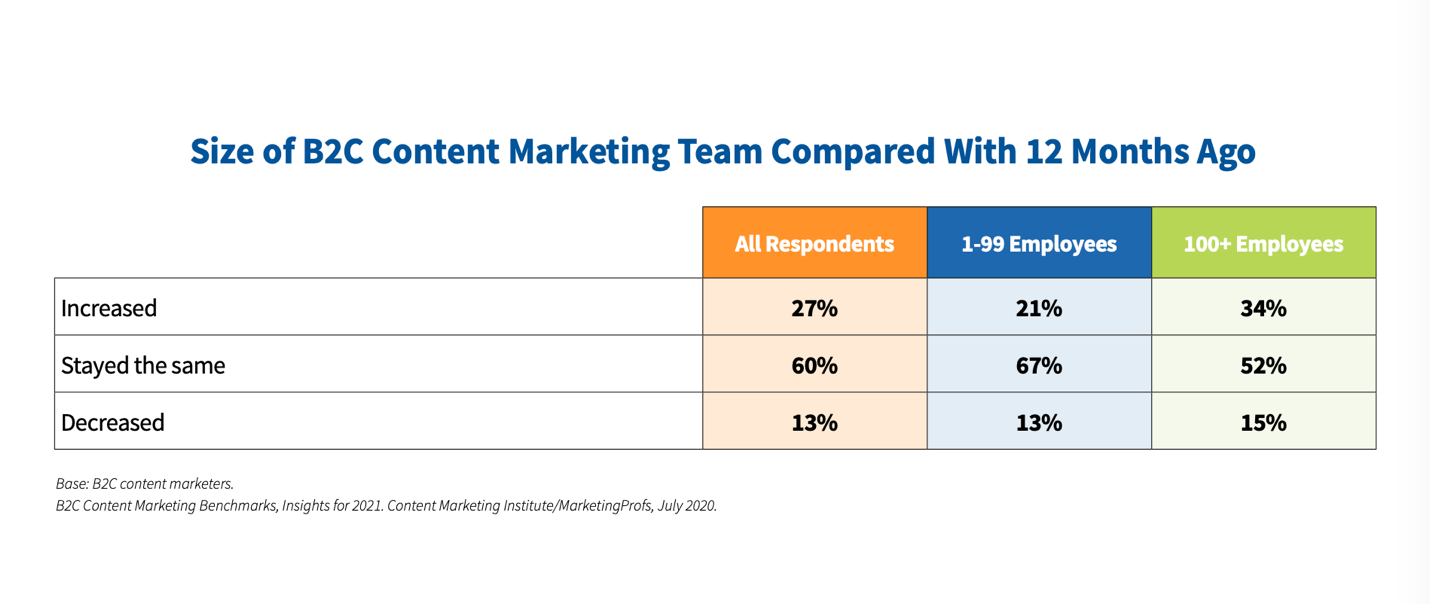
3. 49% of B2C organizations outsource at least some content marketing activities.
In the previous point, I note that while most organizations have kept their teams the same size, 40% have made some changes. This may relate to the fact that organizations are split nearly in half in terms of outsourcing marketing activities. Furthermore, smaller companies are a little more likely not to outsource, perhaps choosing to hire for part-time or full-time roles.
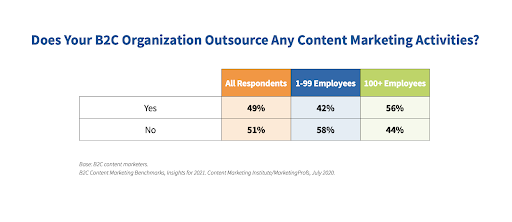
What we see with our own clients is that, while adding headcount can help with bandwidth issues, those roles aren’t always the most efficient at solving the challenges within the organization. Outsourcing areas where you need a higher level of expertise, such as graphic design for specific channels or event production, can help your team to focus on their core competencies.
Next, what do those organizations that outsource focus their energies on?
4. Of the activities organizations outsource, 75% outsource content creation.
It’s no surprise, but as with other years, we see that time and bandwidth is the main challenge that organizations are solving for.
What we see working with both major B2B and B2C brands is that content creation is a popular area to outsource because of its time intensity, but the best content leverages the expertise and relationships of the organization. That’s what builds trust and provides the most long-term value through content marketing–not capturing unqualified leads through chasing keywords. Therefore, outsourcing smarter–through subject matter experts and influencers whom your target audience trusts–can be a powerful way to increase the value of your content marketing.
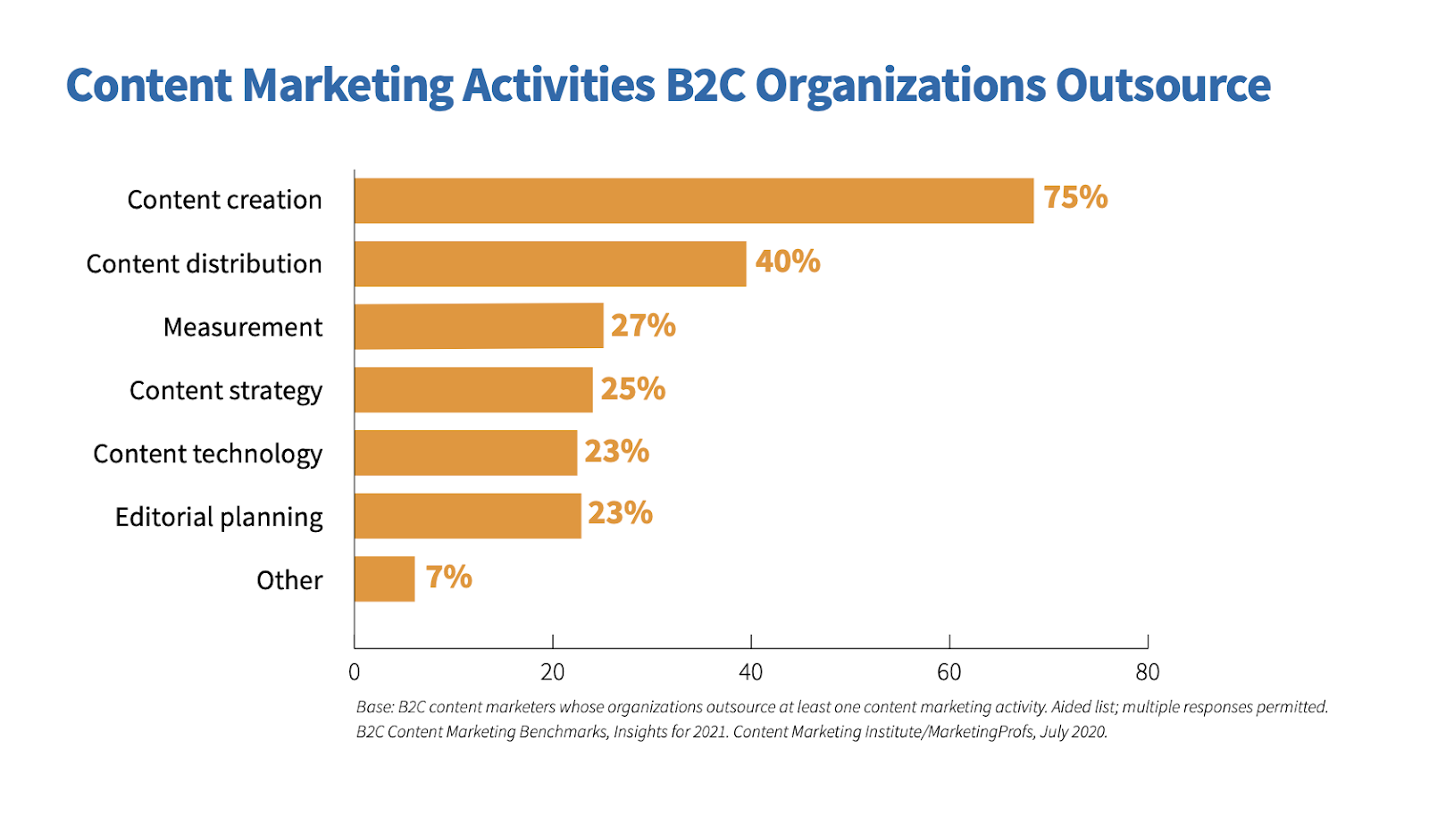
5. What’s changed during the pandemic? A majority of organizations changed their targeting/messaging strategy and/or editorial calendar, yet only 34% reexamined their customer journeys.
It’s understandable that organizations would shift targeting/messaging strategies in the short term, but as we enter the second year of this new way of living, adjusting the models of our customer journeys is vital.

We must understand the new realities that our core customers face, and we must acknowledge that some of our customers may have entirely new considerations. Think about people who used to shop in business districts who now work from home, or about parents who used to have childcare and now have less time between raising their children and work. How can you stay relevant to them while also respecting their time, bandwidth, and priorities?
Taking the time now to re-survey your audiences, do focus groups of your top customers, and remap your customer journeys will allow you to be more thoughtful about what touchpoints your customers need.
6. How have content types changed in the last year? More video, live-streaming, and virtual events compared to the year before.
According to the report, “Virtual events/webinars/online courses increased to 39% from 27% […] Livestreaming content increased to 35% from 13%.”
The media that we’re using to communicate with our audiences have shifted based on the new reality of social distancing, but my prediction would be that there’s more to come.
Many of these shifts will become permanent and/or highly impact our audiences’ expectations of how content is made available to them.

If you’re not already investing in video and virtual event capabilities within your organization, if you’re not training your teams to think about how IGTV or YouTube Live could be incorporated into the experiences you offer your audience from a content marketing perspective, you need to get on that train ASAP.
This isn’t just about the long slide into more video content; it’s about the fact that our audiences need more safe methods to connect with others in their communities. That’s why platforms like Clubhouse are gaining traction: the human interaction and connection that’s available through them.
7. The dominant social media channels are still dominant in B2C.
According to the report, organic social media use is similar to last year’s report, with two exceptions: “Instagram increased to 81% from 74%. YouTube increased to 72% from 62%.”
This information isn’t really a surprise given my previous point about human connection, but the data set doesn’t consider collaboration/participation-centric channels like TikTok (which has recently rolled out self-serve advertising aimed at small businesses) or Clubhouse, which may become a sleeper hit among B2C communities. Will those channels become important within your industry over the next year or two? This is the time to experiment and identify where the opportunities may lie.
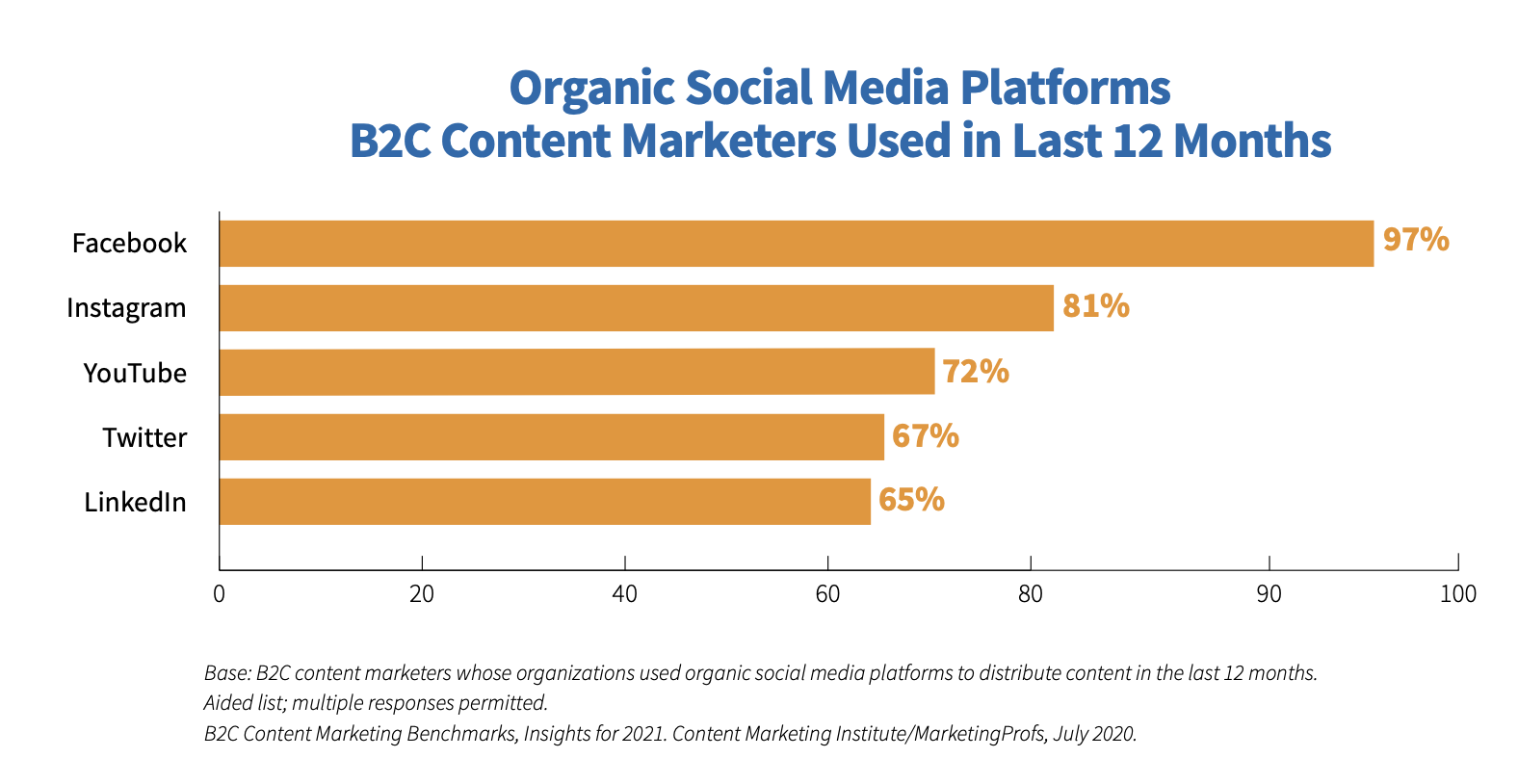
8. Surprisingly, the percent of B2C marketers using paid distribution channels for content marketing went down as compared to the previous year’s report.
I’ve said it previously, and I’ll say it again: paid distribution channels are more necessary than ever to get our content in front of audiences. It’s the nature of the beast, as companies like Google, Facebook, and their competitors more aggressively compete for ad dollars. Yet, the report says, “72% of B2C marketers used paid channels to distribute content in the last 12 months, compared with 85% the previous year.”
What then explains the downward shift in ad dollars among survey respondents? My guess is that because of the narrow wording of this question, budgets may have been shifted from promoting content to direct sales-oriented promotions. However, we know that purchase decisions are often supported by content marketing assets and efforts. Therefore, this shift in budget could be hindering not helping purchase decisions.
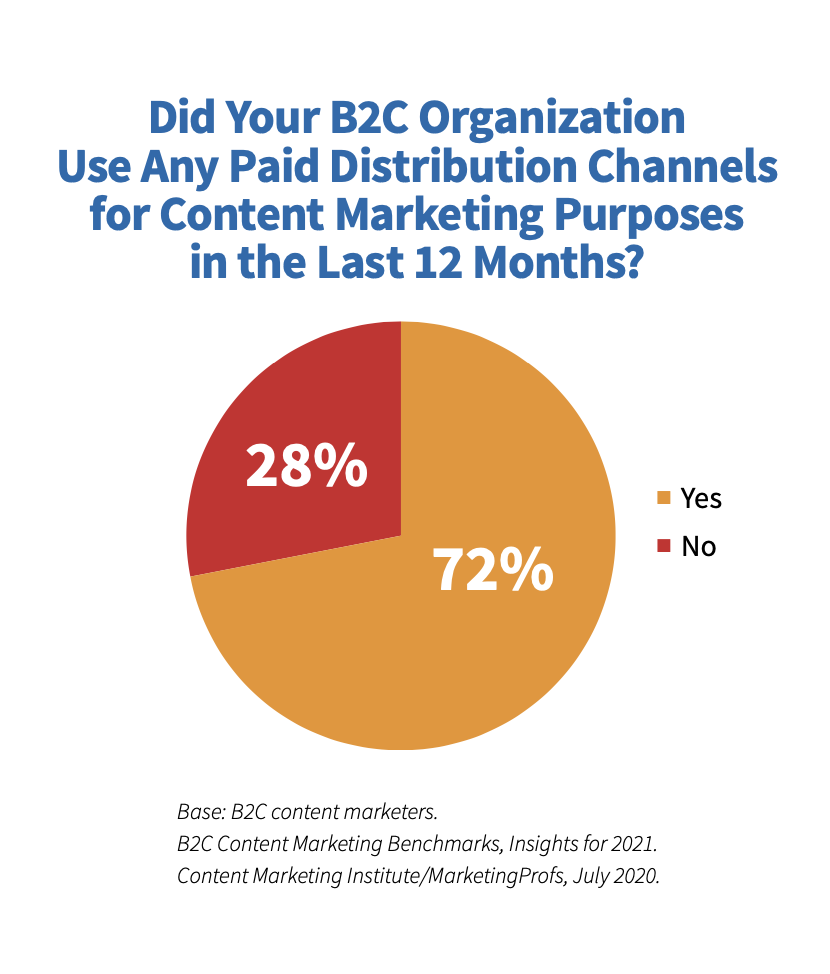
That’s why my earlier point about understanding the shifting customer journeys is more important than ever. Convince & Convert president Jay Baer has spoken at length about the ways in which we need to rewire your business during this time, and it continues to be true.
Based on these observations on how the last year has impacted the practice of content marketing, keep in mind these three guiding principles to move forward in 2021:
- Your audience’s lives are drastically different and, therefore, their behaviors and considerations are too. Be sure you have a shifted your fundamental understanding of what they need.
- It’s not just about what content you create but how it allows your audience to engage. Your audience is looking for content that allows them to feel more connected during these isolating times.
- Make sure you’re nimble and flexible about where and how you use your content marketing budget, considering the needs of your audience. What’s worked previously cannot be a guide for the coming year or two.
The post 8 B2C Content Marketing Statistics and Trends for 2021 appeared first on Content Marketing Consulting and Social Media Strategy.

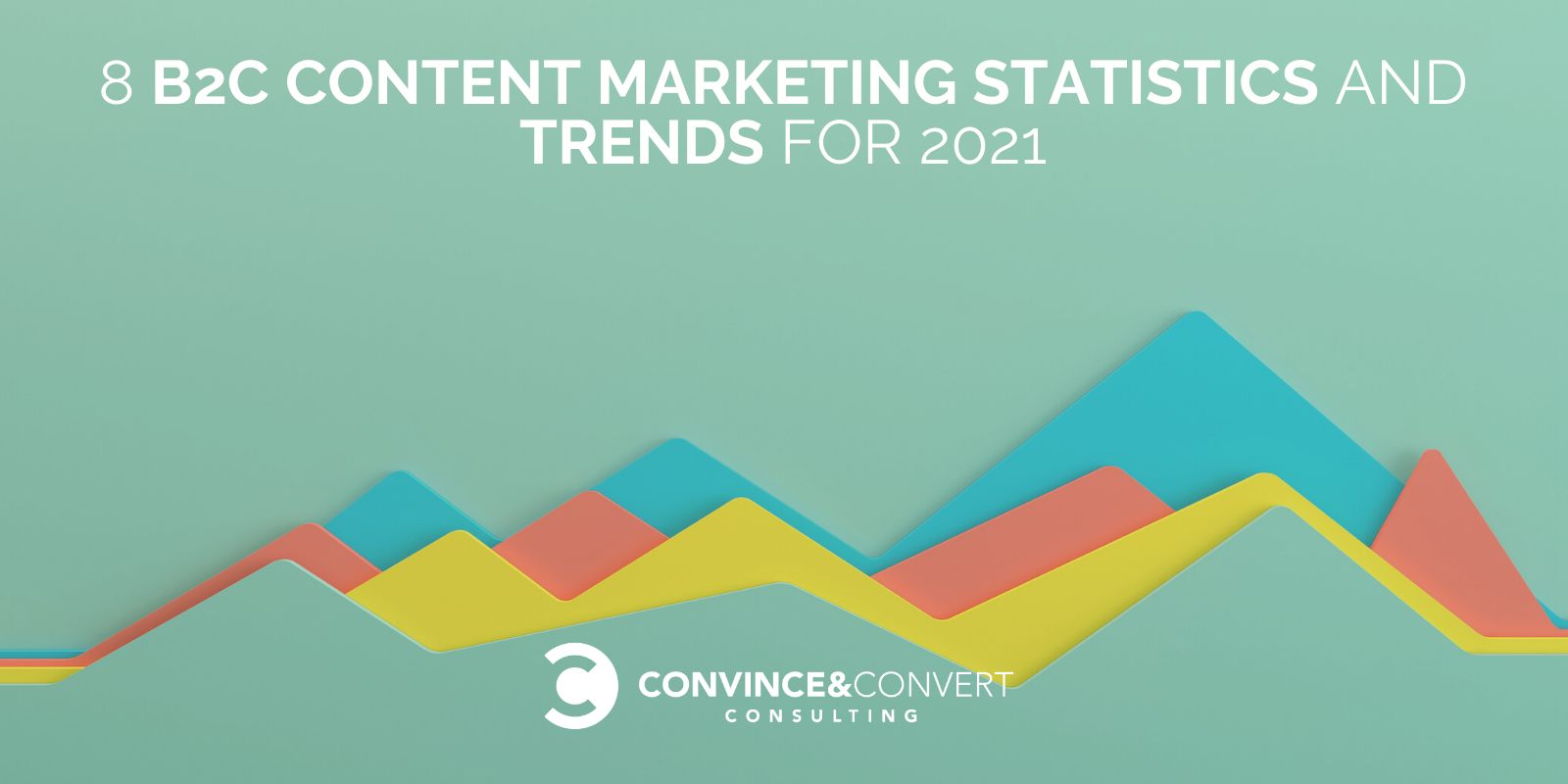
![Read more about the article The Best Times To Post On Social Media In 2022: An Analysis Of More Than 35 Million Posts [Original Research]](https://www.dimaservices.agency/wp-content/uploads/2022/05/The-Best-Times-To-Post-On-Social-Media-In-2022-300x128.png)

